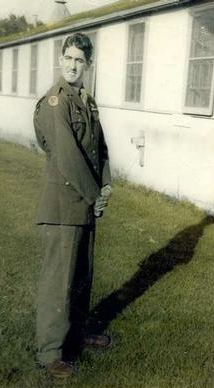423/F
106th Infantry Division
 Guy Stephens of Yankeetown, Ind. shown here at Camp Atterbury, Ind. during WWII. He was soon fighting in Europe before being wounded and captured by Germans at the Battle of the Bulge. |
 |
The years wash away as 81-year-old Guy Stephens speaks of World War II, how at 19 in December 1944 he was wounded and captured by the Germans at the bloody Battle of the Bulge.
He remembers the fog, snow and subzero temperatures and how the Germans — though they knew the war was a lost cause — put straw on roads in order to sneak in tanks and lay waste to the Americans they outnumbered. Sort of a last-stand "take that."
Stephens, 81, was part of the Army's 106th Infantry Division, or Golden Lions. (423/F)
"I ended up with frozen feet and a small wound," says the Yankeetown, Ind., resident. From December 1944 until his liberation on Easter Sunday 1945, he was in a German prisoner of war camp, Stalag IX-B, going from 180 pounds to 128, with no baths and little food to eat out of his helmet.
"All we talked about was food, what we used to have for Thanksgiving," chuckles Stephens, retired principal of Yankeetown elementary school.
Filmmaker Ken Burns' highly-anticipated, seven-part series, "The War," is about to unfold on PBS stations nationwide.
The first four episodes will air at 7 p.m. Sunday through Sept. 26 on WNIN-PBS9 in Evansville, with the final three episodes Sept. 30 to Oct. 2. The program will repeat after each episode.
Aldridge said not all 46 people interviewed for "Answering the Call" made it into the final cut, "but all the interviews will be permanently archived in the Library of Congress."
Those interviewed ranged from a few WAVES (Women Accepted for Volunteer Emergency Service) and WACs (Women's Army Corps) to a tailgunner, a soldier wounded at D-Day and combat veterans such as Stephens.
"I think for some of the veterans it was the first time they had opened up like this," said Aldridge. "It was very touching."
Although he later would go to Evansville College on the G.I. Bill, Stephens was from a Depression-era family, what former NBC newsman Tom Brokaw dubbed "the Greatest Generation."
"We were poor country people. Six kids, mom and dad,"
says Stephens. "Mom would give us four boys a dime to share for lunch.
For a nickel we could get three cents worth of cheese, about four thin
slices, and for two cents some crackers, and around the corner was a
doughnut shop that sold us several day-old doughnuts for a nickel."